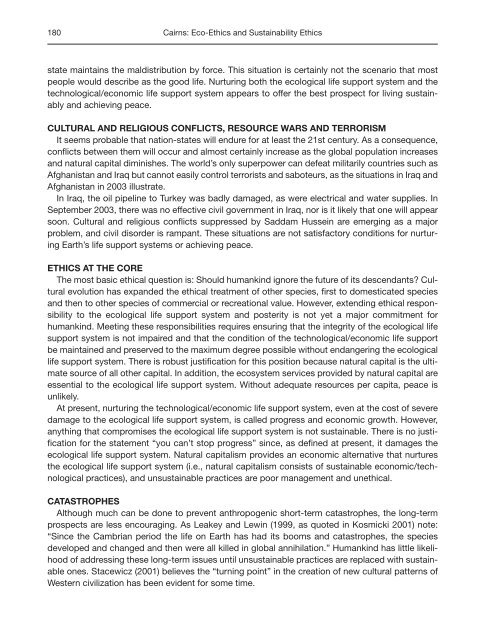View - ResearchGate
View - ResearchGate
View - ResearchGate
Create successful ePaper yourself
Turn your PDF publications into a flip-book with our unique Google optimized e-Paper software.
180Cairns: Eco-Ethics and Sustainability Ethicsstate maintains the maldistribution by force. This situation is certainly not the scenario that mostpeople would describe as the good life. Nurturing both the ecological life support system and thetechnological/economic life support system appears to offer the best prospect for living sustainablyand achieving peace.CULTURAL AND RELIGIOUS CONFLICTS, RESOURCE WARS AND TERRORISMIt seems probable that nation-states will endure for at least the 21st century. As a consequence,conflicts between them will occur and almost certainly increase as the global population increasesand natural capital diminishes. The world’s only superpower can defeat militarily countries such asAfghanistan and Iraq but cannot easily control terrorists and saboteurs, as the situations in Iraq andAfghanistan in 2003 illustrate.In Iraq, the oil pipeline to Turkey was badly damaged, as were electrical and water supplies. InSeptember 2003, there was no effective civil government in Iraq, nor is it likely that one will appearsoon. Cultural and religious conflicts suppressed by Saddam Hussein are emerging as a majorproblem, and civil disorder is rampant. These situations are not satisfactory conditions for nurturingEarth’s life support systems or achieving peace.ETHICS AT THE COREThe most basic ethical question is: Should humankind ignore the future of its descendants? Culturalevolution has expanded the ethical treatment of other species, first to domesticated speciesand then to other species of commercial or recreational value. However, extending ethical responsibilityto the ecological life support system and posterity is not yet a major commitment forhumankind. Meeting these responsibilities requires ensuring that the integrity of the ecological lifesupport system is not impaired and that the condition of the technological/economic life supportbe maintained and preserved to the maximum degree possible without endangering the ecologicallife support system. There is robust justification for this position because natural capital is the ultimatesource of all other capital. In addition, the ecosystem services provided by natural capital areessential to the ecological life support system. Without adequate resources per capita, peace isunlikely.At present, nurturing the technological/economic life support system, even at the cost of severedamage to the ecological life support system, is called progress and economic growth. However,anything that compromises the ecological life support system is not sustainable. There is no justificationfor the statement “you can’t stop progress” since, as defined at present, it damages theecological life support system. Natural capitalism provides an economic alternative that nurturesthe ecological life support system (i.e., natural capitalism consists of sustainable economic/technologicalpractices), and unsustainable practices are poor management and unethical.CATASTROPHESAlthough much can be done to prevent anthropogenic short-term catastrophes, the long-termprospects are less encouraging. As Leakey and Lewin (1999, as quoted in Kosmicki 2001) note:“Since the Cambrian period the life on Earth has had its booms and catastrophes, the speciesdeveloped and changed and then were all killed in global annihilation.” Humankind has little likelihoodof addressing these long-term issues until unsustainable practices are replaced with sustainableones. Stacewicz (2001) believes the “turning point” in the creation of new cultural patterns ofWestern civilization has been evident for some time.















